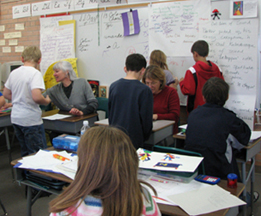 I believe that educators, school librarians in particular, should maintain a membership in the Association for Supervision and Curriculum Development (ASCD), read ASCD publications, and be as involved as possible in this organization. The target audience for ASCD’s journal Educational Leadership is “leaders in elementary, middle, and secondary education but it is also for anyone interested in curriculum, instruction, supervision, and leadership in schools” (quoted from the masthead of the journal).
I believe that educators, school librarians in particular, should maintain a membership in the Association for Supervision and Curriculum Development (ASCD), read ASCD publications, and be as involved as possible in this organization. The target audience for ASCD’s journal Educational Leadership is “leaders in elementary, middle, and secondary education but it is also for anyone interested in curriculum, instruction, supervision, and leadership in schools” (quoted from the masthead of the journal).
In addition to the fact that school librarians should be leaders in curriculum and instruction in their schools, many principals are ASCD members and read Educational Leadership during the academic year. Since a principal’s understanding of the role of the school librarian in the learning community is essential to our success, school librarians should be able to talk with their principals on topics that ASCD identifies as important for their readership.
Last week when this month’s issue arrived in my mailbox, I was thrilled to see the title “Professional Learning: Reimagined.” I saved it to read until I could immerse myself in the content, which I did over this past weekend. Just to mention the foci of a few articles… The opening feature by Dr. Guskey, from the University of Kentucky, focuses on professional learning designed with backward planning from the desired student learning outcomes and evidence-based practice. Check. Articles on video capture of teaching, coaching, teacher-taught tech camps, and the failure of top-down approaches… Check. Dr. Richard DuFour, Professional Learning Communities (PLCs) expert, provides successful PLCs case studies. Check. While I don’t disagree with any of the articles in this issue, this issue fell short for me in terms of “reimagining” professional learning.
There were two articles in the issue that had the potential to delve deep into the growing understanding of the value of job-embedded professional development—one by Dr. DuFour and one by Emily Dolci Grimm, Trent Kaufman, and Dave Doty. I want to share some of Dr. DuFour’s ideas and build on those for a discussion of the Grimm, Kaufman, and Doty article on Thursday. I hope you have read this issue and will join in and make this a conversation.
In his article “Harnessing the Power of PLCs,” Dr. DuFour shares four case studies where PLCs using different strategies have been effective in supporting teachers to collectively improve student learning outcomes. He bases his article and scholarly work on research-based evidence that effective professional development is:
• Ongoing, with sustained, rather than episodic and fragmented, focus.
• Collective, rather than individualistic.
• Job-embedded, with teachers learning as they engage in their daily work.
• Results-oriented, with activities directly links to higher levels in student learning.
• Most effective in schools and districts that function as professional learning communities (31).
This research in consistent with my own experience as an educator and school librarian. The first four keywords italicized by Dr. DuFour are the very reason PLCs can be effective. However, in the four case studies discussed none of them mentions real-time job-embedded professional development where educators learn as they engage in their daily activities teaching students. While there is a collective focus on student learning outcomes and face-to-face or virtual observations of successful practices in other classrooms with other teachers’ students in the same school or across the district, none of these educators were learning while coteaching during the school day with a peer (one another educator) in the same classroom with their own students, resources, supports, and constraints.
Clearly, the PLC strategies offered in the article were successful for these schools but could they have been even more successful if educators’ professional learning happened in their own classrooms in the company of a coteacher who was equally invested in the students’ learning outcomes? My answer is an enthusiastic “yes!”
In DuFour’s article, Regina Owens, the first principal, at The Virtual School of Springfield ISD, noted: “In a traditional school, you hoped teachers implement the new strategy, but it was difficult to be certain” (35).
But there is a way to be certain in schools with a 21st-century school librarian. When classroom teachers and school librarians coplan for standards-based, data-driven instruction targeted to specific student learning outcomes, administrators can be assured that best practices are being implemented in the classroom and in the library. Two or more educators who coplan, coimplement, and coassess student learning outcomes can develop their instructional proficiency in job-embedded professional development learning with and from each other in real time.
What has been your experience of classroom-library collaboration that has led to improved student learning? How is this low-threat, organic strategy conducive to educator learning?
On Thursday, I will continue my response to this issue of Educational Leadership.
Works Cited
DuFour, Richard. “Harnessing the Power of PLCs.” Educational Leadership 71.8 (2014): 30-35. Print.
Judi Moreillon (librarian) and Rochelle Thompson (5th-grade teacher), cofacilitating writing conferences in Rochelle’s classroom, from the Personal Collection of Judi Moreillon – Used with Permission
